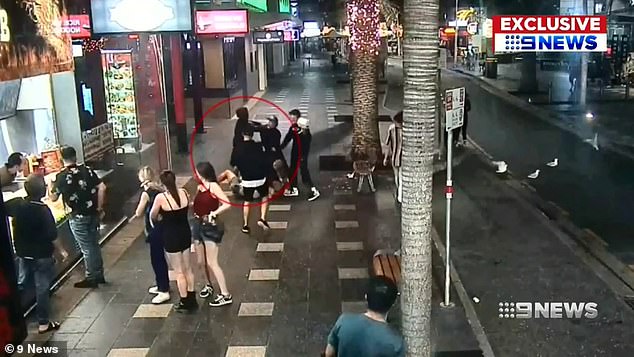The man convicted of killing a Brazilian student with a single punch during a fight over a stolen chip is appealing his four-year sentence.
Ricky Lefoe, 32, was found guilty in February of killing Ivan Susin outside a Gold Coast kebab shop in September 2019 after his friend stole a hot chip from Susin’s friends.
Moments after a fight broke out between the two groups, the 29-year-old Brazilian student was knocked down by a single punch from Lefoe.
Mr Susin died 11 days after suffering the fatal head injury.
Lefoe’s friend Shaun Simpson had stolen a French fry from two of Susin’s friends who were sitting on a nearby bench, sparking a disagreement between the two groups.
Mr Susin approached the group in an attempt to help his friends and punched Mr Simpson.
CCTV footage shown during the trial shows the moment Susin threw the punch but missed completely.
It was this action that prompted Lefoe to throw the fatal punch that left Mr. Susin unconscious on the ground.
Ricky Lefoe, 32, is appealing his four-year jail sentence for punching Brazilian student Ivan Susin to death

Ivan Susin was tragically killed in a fight outside a Gold Coast kebab shop in September 2019.
On Wednesday, Lefoe lodged his appeal with the Queensland Court of Appeal.
His lawyer Stacey Francis told the court that during the trial the prosecution had pursued a series of questions that “shut down” part of her client’s defence.
Ms Francis said the jury had been inadvertently asked to decide whether Mr Susin’s failed punch at Mr Simpson demonstrated he had some level of “self-control”, and if the jury was “satisfied” he was “acting intentionally” to protect his friend, then the prosecution’s argument of provocation could not have been found.
“The appellant (Lefoe) did not do what he did because of the protection mechanism, it was because he wanted Mr Simpson to win the fight,” Ms Francis said.
‘The appellant’s conduct is no more serious than that of the deceased. In fact, it could be less serious because it did not involve that element of force.
‘The Crown did not appeal to the jury on the basis that the deceased posed a threat other than a risk of grievous bodily harm.’

The argument between the two groups broke out over a stolen chip, but had deadly consequences.
Judge Debra Mullins said she understood Ms Francis’ argument “theoretically” but after watching CCTV footage of the fight “a number of times” she found there was “only one answer” to the question of whether there was any provocation in Lefoe’s actions and that answer was “yes”.
“Someone may deliberately join a fight because of the provocation of someone who started the fight,” Judge Mullins said.
‘All the references you are referring to are not about provocation.’
Ms Francis said Mr Susin’s actions were “deliberate” and he had not lost control when he became involved in the fight.
“This was calculated, a blow designed to cause injury,” he said.
‘All these allegations taken together suggest that the deceased behaved with intent, deliberation and calculation and that this does not imply a loss of self-control.
‘If the jury accepts the logic that the deceased was rational, controlled, deliberate… they lose their forensic battle.’

